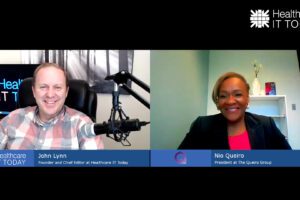Managing health data is no longer as simple as archiving it for the odd retrieval by a clinician down the road. Today, health data is a strategic asset. Mining that data can lead to critical operational and clinical insights. Plus the data itself is critical to the creation of AI engines and machine learning algorithms. To manage health data properly, healthcare organizations need to think differently about data storage.
Passive Data Archives
It wasn’t that long ago that the most complex questions regarding health data storage were: Is there enough hard drive space to archive the data? and Is that archive secure? There wasn’t much more too it than that.
Today however, health data is much more valuable and healthcare organizations no longer just archive it. We now health data for operational insights. We use deidentified datasets built off the collected health data for research. We even train artificial intelligence engines and develop machine learning algorithms using health data.
As the uses for health data have grown, so too has our need for better storage solutions. Put another way, it’s time we start thinking about data storage differently in healthcare.
Healthcare IT Today recently sat down with Josh Gluck, VP of Global Vertical Alliances & Solutions at Pure Storage and Jon Kimerle, Global Healthcare Alliances at Pure Storage. We discussed the changing requirements for data storage in healthcare and how risky it can be to leave it in passive legacy archive systems.
Thinking Differently
“Data in healthcare used to be limited by what was captured with pen and paper,” said Gluck. “Now we are collecting data through every interaction. We are even collecting it through the watches we wear and the connected devices in our homes. For years, we just assumed that the storage systems we had in were good enough. That isn’t the case anymore.”
Both Gluck and Kimerle are encouraging healthcare organizations to consider storage as a strategic assets and as a potential risk.
When organizations have a storage system that provides fast + reliable access whenever and wherever health data is needed, it is an asset to the organization. Decisions can be made quicker. Trust in the organization’s technology infrastructure increases. Workflows are more efficient.
If however, data resides on legacy storage (ie: on hard drives on aging servers in a data closet that has not been upgraded in the past 2 years) it poses a risk to healthcare organizations. There is the real risk of data security because legacy systems often lack the degree of hardening that is required to withstand today’s cybersecurity threats. There is also opportunity risk because that data may not be readily accessible when it is needed by a clinician, a researcher, or a staff member.
“Data is the new oil in healthcare,” said Kimerle.
Watch the full interview with Jon Kimerle and Josh Gluck to learn:
- How Pure Storage is working with Epic
- What approach works best for storing data in healthcare
- Why Pure Storage has a focus in healthcare
Learn more about Pure Storage at: https://www.purestorage.com/
Listen and subscribe to the Healthcare IT Today Interviews Podcast to hear all the latest insights from experts in healthcare IT.
And for an exclusive look at our top stories, subscribe to our newsletter.
Tell us what you think. Contact us here or on Twitter at @hcitoday. And if you’re interested in advertising with us, check out our various advertising packages and request our Media Kit.













